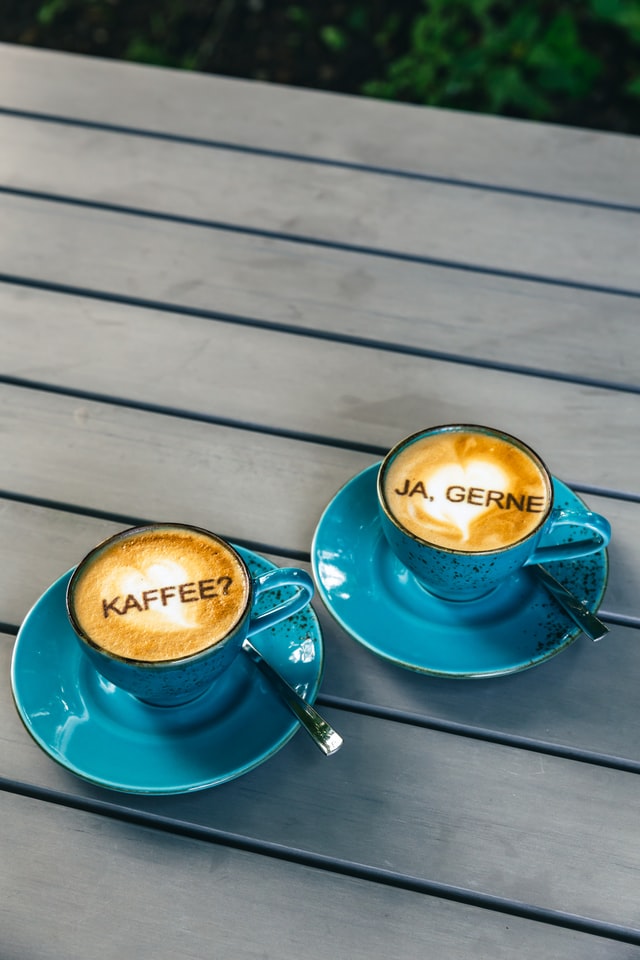Hallo Wie Geht Es Dir
Guten Tag! Wie geht's? In my concluding mail service, we looked at alternative ways of saying this phrase, which means 'How are you?' in German. In this post, nosotros're going to look at culling responses yous can requite, aside from the standard 'Gut, danke' ('Good, thank you'). After all, what if you're non feeling good? Or what if someone asks you lot, 'Was gibt's denn Neues?' ('What's new?') – or whatever other question that tin't logically be answered with 'Gut, danke'?! Read on for a choice of different responses to assist expand your vocabulary and take ameliorate conversations (even during small talk)!
das Geplauder – Modest talk
(… although it's likewise chosen der Smalltalk in German language)
First of all, here are some standard responses if you but want to be polite and answer the question, without getting into further conversation. Starting with the go-to exchange:
Wie geht es dir? (How are you?)
Gut, danke. (Good, thank you)
If you wanted to ask the other person how they are, simply add, 'Und dir?' ('And you?') onto the end of your response.
Y'all can also reply 'Gut, danke' to the following questions:
Wie läuft'south? ('How's it going?')
Wie geht's, wie steht'south? ('How'due south it going?')
Geht es dir gut? ('Are you well?')
Alles okay? ('Everything OK?')
Wie fühlst du dich heute? ('How are you feeling today?')
If someone asks you, 'Was geht ab?' ('What's happening?/What's upwards?') or 'Was gibt's denn Neues?' ('What's new?'), you tin respond with 'Nicht viel' ('Not much') or 'Einiges' ('Quite a lot/A off-white bit').
If someone asks you, 'Was macht die Arbeit?' ('How's work?'), a neutral response would be something like, 'Wie immer' ('As always'/'Same sometime') or 'Passt schon' ('All skilful').
Other, neutral responses to similar questions are: 'In Ordnung' ('All good'/'No problems') or 'Ich kann mich nicht beschweren' ('Can't complain').
Wie geht's?
Now, if yous want to open up upward the conversation a piffling more, here are a option of phrases you can utilise to let the person know y'all've got more to say:
'Weißt du was' is a dandy piffling opener that means 'you lot know what?' and tin can be used to depict the listener in:
Weißt du was, Josh, mir geht's…
You know what, Josh, I experience…
Weißt du was, Josh, alles ist super!
You know what, Josh, everything's bright!
'Eigentlich' is a style of proverb 'actually' or 'every bit a affair of fact', and can be used to bespeak your answer will get straight to the point:
Eigentlich bin ich sauer.
Actually, I'm angry.
Eigentlich fühle ich mich, als hätte ich keine Ahnung, was ich tue.
Really, I feel like I have no clue what I'm doing.
'In letzter Zeit' means 'lately' or 'recently'. Yous might desire to use this i to indicate a change in your circumstances or mood:
Ich bin in letzter Zeit so müde!
I'g then tired lately!
If things aren't going and so well (and you want people to know!), you might utilise this little phrase:
Ach, frag nicht! – Ugh, don't inquire!
Now, if y'all wanted to take a longer chat, it would make sense to ask the other person if they're free first. An commutation may wait like this:
Hey, Sara! Was geht ab?
Hallo, Matthias. Einiges. Hast du Zeit für einen Kaffee/ein Bier?
Ja, natürlich! Erzähl mir alles.
Hey, Sara! What's up?
Hi, Matthias. A whole lot. Exercise yous take time for a java/a beer?
Yeah, of class! Tell me everything.
Sometimes, nosotros actually need someone to talk to, but it tin be difficult to ask. It's very piece of cake to get robotic when we have the 'Wie geht es dir?'/'Gut danke' exchange (in any language!), every bit we ofttimes reply 'Gut, danke' when we are feeling annihilation only gut! The next time you feel low and someone asks how you are, if yous trust that person then tell them:
Ich fühle mich einsam. Ich brauche jemanden zum Reden.
I feel lonely. I need someone to talk to.
Finally, you might similar to thank the person for asking most you, or for listening to yous. Simply say:
Danke fürs Fragen – Thank you for asking.
Danke fürs Zuhören – Thanks for listening.
I hope this has been helpful. If you lot'd like more vocabulary for feelings & emotions, click on this post: Expressing Feelings and Emotions | High german Blog (transparent.com)
Bis bald
Constanze
Source: https://blogs.transparent.com/german/responding-to-wie-gehts-in-german/


0 Response to "Hallo Wie Geht Es Dir"
Post a Comment